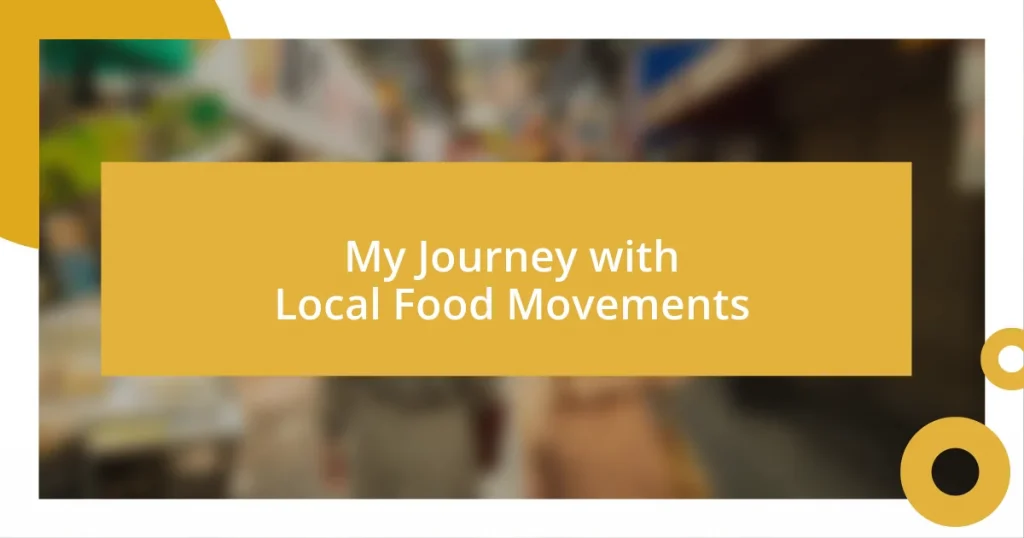Key takeaways:
- Local food movements foster community connections, sustainability, and awareness of food origins, enhancing overall meal experiences.
- Supporting local food benefits freshness, environmental sustainability, and local economies while promoting cultural connections and transparency in food sourcing.
- Engagement through volunteering, participating in CSAs, and advocating for local food policies strengthens community ties and supports local agriculture.
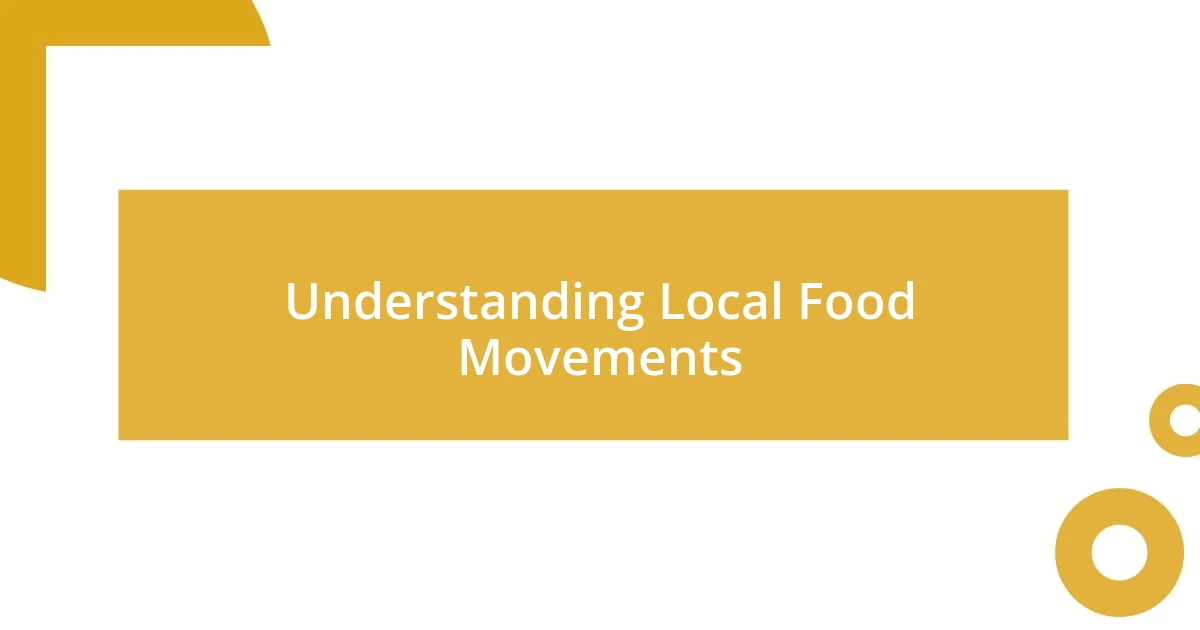
Understanding Local Food Movements
Local food movements emphasize the importance of community, sustainability, and health by encouraging consumers to support local farms and markets. I remember the first time I visited a nearby farmer’s market. The vibrant colors of fresh produce and the friendly conversations with the farmers sparked something within me—an awareness of where my food came from and the stories behind it. Isn’t it eye-opening to realize that every bite can connect us to our community?
Understanding local food movements also involves recognizing the impact of food choices on the environment. I often ponder this when I’m grocery shopping; choosing seasonal, locally-sourced products not only reduces the carbon footprint associated with transportation but also supports the economy in my area. It makes me feel like a small part of something bigger, essentially a movement towards a more sustainable way of living.
Moreover, these movements challenge us to rethink the relationship we have with our food. Have you ever considered how often we take the origins of our meals for granted? I remember feeling a deeper connection to my meals once I started cooking with locally sourced ingredients. Each dish became more than just sustenance; it transformed into a celebration of my surrounding community, and I found joy in the simplicity of knowing exactly where my food came from.
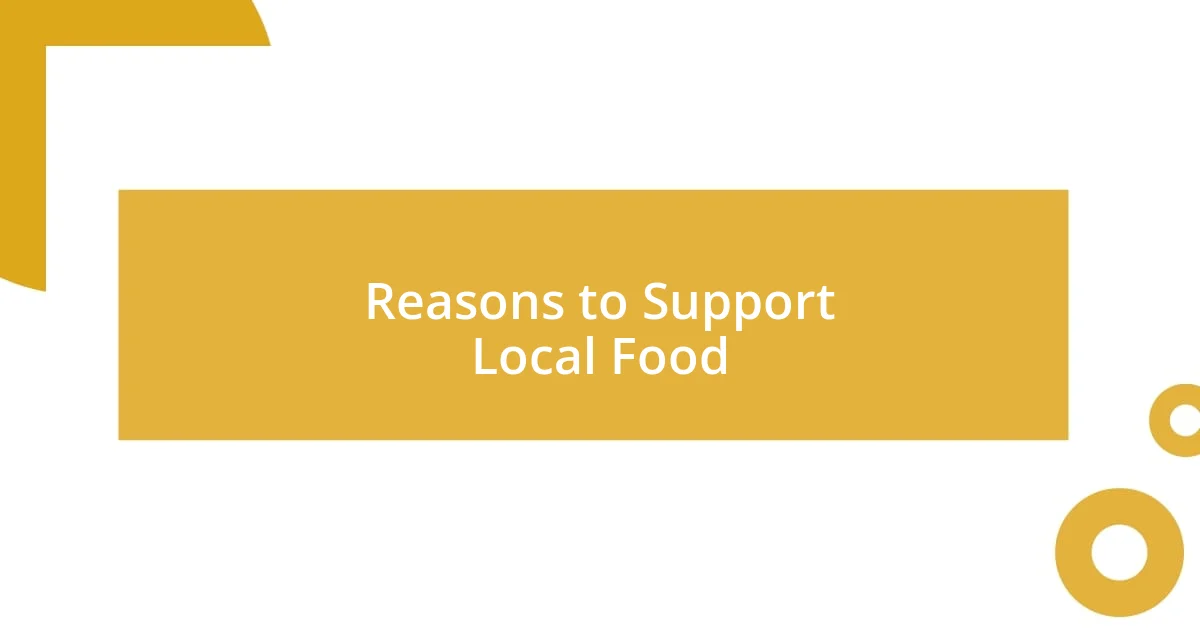
Reasons to Support Local Food
Supporting local food has far-reaching benefits that resonate with both our communities and our personal well-being. I recall a delightful afternoon spent picking ripe tomatoes at a neighbor’s farm. Not only did I enjoy the freshest produce, but I was also struck by the warmth of the community around me. Knowing that my choices would help local farmers sustain their livelihoods felt empowering—it was as if my little efforts could spark a positive change. Each local purchase is a vote for a system that prioritizes quality, freshness, and connection.
Here are a few compelling reasons to support local food:
- Freshness and Flavor: Local food is often harvested at peak ripeness, resulting in better taste and nutritional value.
- Environmental Benefits: Reducing transportation emissions leads to a smaller carbon footprint, promoting sustainability.
- Revitalizing the Community: Supporting local farms helps keep money circulating within the community, fostering economic resilience.
- Cultural Connections: Local food movements celebrate regional cuisines and traditions, enriching our culinary experiences.
- Transparency: With local producers, it’s easier to know how food is grown, fostering trust and accountability.
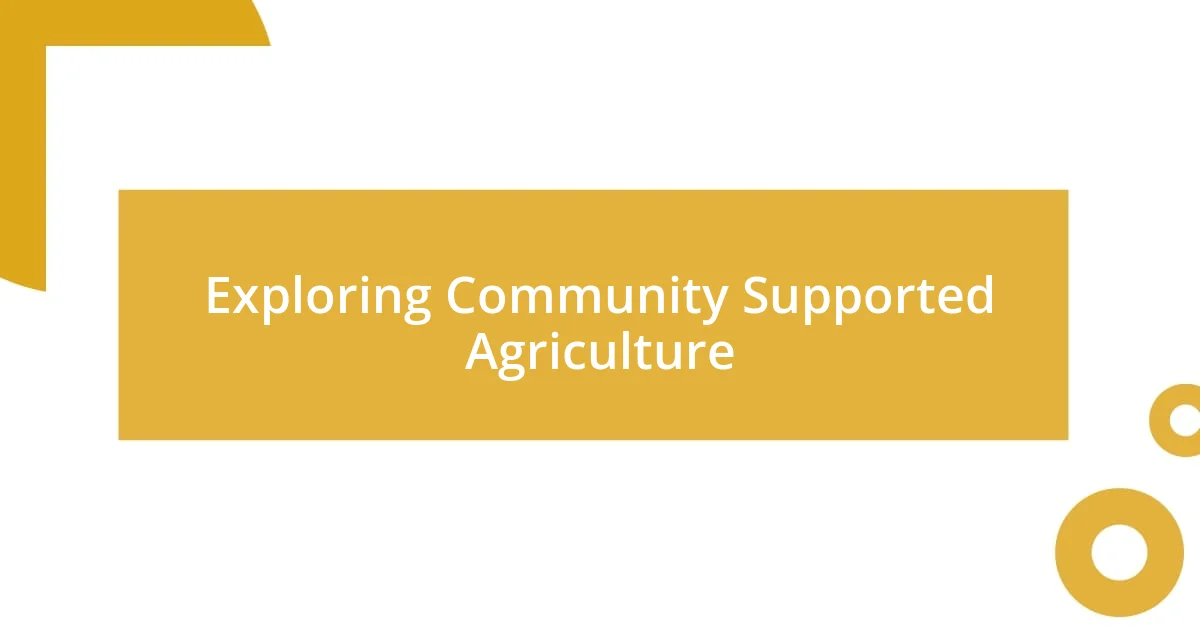
Exploring Community Supported Agriculture
Community Supported Agriculture (CSA) offers a unique way for individuals to engage with local farms. I remember the thrill of signing up for my first CSA subscription; it felt like receiving a surprise gift each week. Opening the box full of seasonal goodies was like unwrapping the earth’s bounty, and it made me excited to cook with new ingredients I’d never considered before. When I learned that my subscription helped ensure steady income for local farmers, it deepened my appreciation for the hard work they put into nurturing the land.
One of the most profound aspects of participating in a CSA is the direct connection it fosters between consumers and producers. I’ll never forget a farm tour I joined as part of the program. Walking through the fields, I met the farmer—who vividly shared his sustainable practices—and I could practically taste his passion in the fresh vegetables we picked together. It reminded me that my food choices are not just about sustenance; they tell a story of dedication, culture, and resilience. Isn’t it refreshing to know exactly where your food comes from and the effort behind each harvest?
Another appealing factor of CSAs is embracing the idea of seasonality. When I first started receiving produce that reflected the local growing season, I discovered new recipes and learned to appreciate the rhythm of nature. It encouraged creativity in my kitchen and appreciated the fleeting nature of ingredients. After all, there’s something special about enjoying fresh strawberries in June and hearty squash in the fall—it connects you more deeply to the cycles of life around you.
| Aspect | CSA Benefits |
|---|---|
| Connection | Builds relationships between consumers and local farmers |
| Freshness | Delivers seasonal produce that’s often picked at peak ripeness |
| Support | Provides financial security to local farms |
| Education | Offers insights into sustainable farming practices |
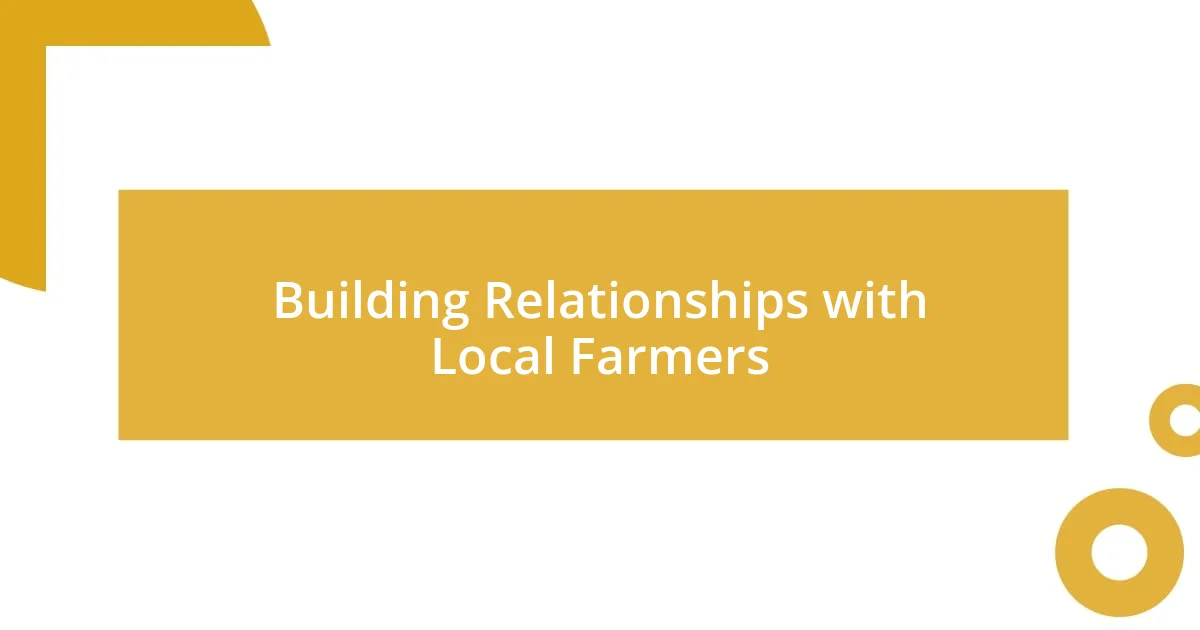
Building Relationships with Local Farmers
Building relationships with local farmers has been a transformative journey for me. I remember the first time I visited a local farmers’ market, engaging the farmers as they shared stories about their produce. Those conversations were not just small talk; they created a space where I learned about organic farming methods and seasonal cycles. Have you ever realized how much richer our food experiences become when we know the hands that cultivated them?
One of my most cherished moments was when I helped a local farmer during the harvest. As we picked crops together, I felt the camaraderie and dedication that radiated from his every movement. That day, I didn’t just learn about the labor involved; I felt the heartbeat of our community. It made me appreciate the entire process of growing food, reminding me that every bite is intertwined with someone’s passion and hard work.
In forging these connections, I’ve discovered the importance of trust. When I purchase directly from farmers, I know I’m supporting ethical practices and sustainable methods. I often think back to a time when I was given a tour of a farm. The farmer explained his commitment to regenerative agriculture, and I left feeling inspired—seeing firsthand how my choices could support not just local economies but also the health of our planet. Isn’t it incredible how personal relationships can enhance our understanding of the food system?
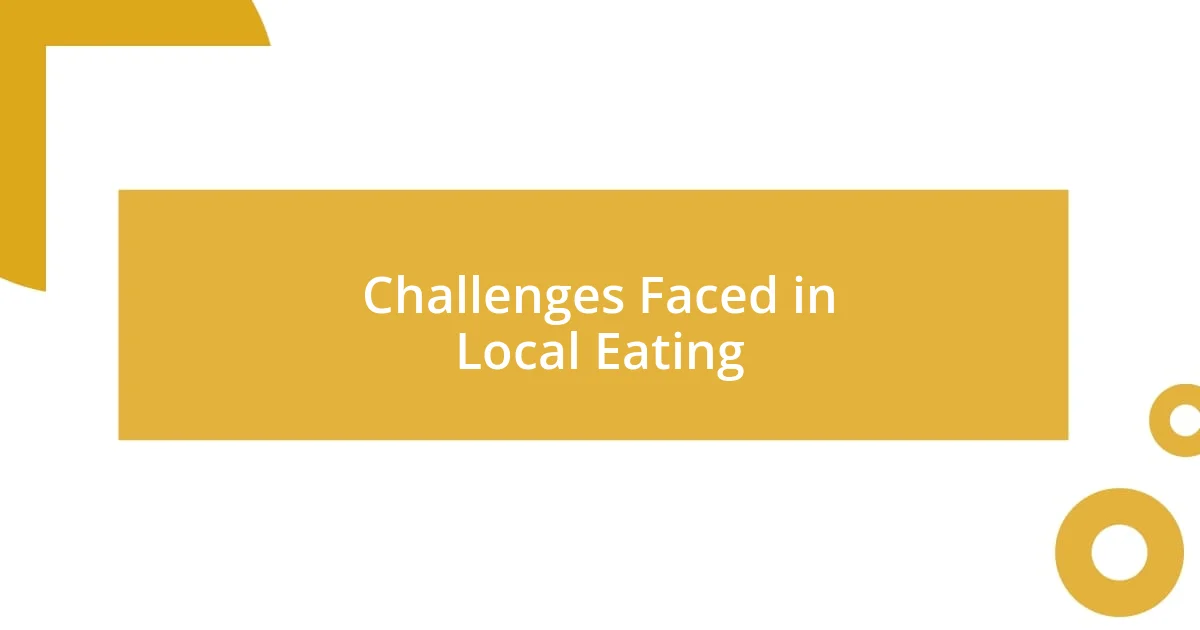
Challenges Faced in Local Eating
While local eating has many rewards, it can also present significant challenges. Sometimes, sourcing local food can feel like a treasure hunt. I recall a particularly frustrating week when I found myself driving around to various farmers’ markets, only to discover many vendors were out of stock on the items I was hoping to find. It was disheartening, but it also made me reflect on how seasonal and limited local crops can be.
Access can be another hurdle. Not everyone has a farmers’ market nearby or the means to join a CSA, and I understand that frustration all too well. During my early days embracing local eating, I was living in an area where such options felt scarce. It made me appreciate the convenience of traditional grocery stores, even if they didn’t share the same commitment to local sourcing. Have you ever felt that tug between convenience and the desire to eat consciously?
Pricing is yet another challenge I encountered. Local produce can sometimes come with a higher price tag, which can be a barrier for many families. I’ve had conversations with friends who struggle to justify paying more for organic carrots or tomatoes when the conventional ones are so much cheaper at the supermarket. It made me realize that advocating for local food not only requires passion but also creativity in budgeting and meal planning. Balancing cost with quality is a dance I’ve had to learn, and it’s prompted me to seek out ways to make local eating more accessible for myself and others.

Tips for Getting Involved Locally
Getting involved with local food movements can be both fulfilling and impactful. One of the most rewarding ways I’ve connected with my community is by volunteering at local farms. I remember my first experience on a small organic farm; there was something truly special about getting my hands dirty while learning the ins and outs of sustainable practices. Have you ever felt that rush of satisfaction from contributing directly to something meaningful? It not only helped me understand the challenges farmers face but also deepened my appreciation for the food on my plate.
Joining a community-supported agriculture (CSA) program can also be a great avenue. I vividly recall the excitement I felt the first time I received my weekly box filled with fresh, seasonal produce. It felt like unwrapping a surprise gift every week! Plus, this experience encourages me to be creative in the kitchen as I experiment with ingredients I might not have chosen otherwise. Have you thought about how challenging it might be to cook with a mystery vegetable? It’s a fun way to expand your culinary skills while supporting local growers!
Lastly, engaging in local food advocacy can amplify your efforts. I attended a town hall meeting where local food policies were being discussed, and it was eye-opening. I felt a surge of empowerment as I listened to community members share their visions for a better food system. Speaking up can make a difference! Have you considered how your voice could contribute to changes in local food policies? Each conversation can shape a healthier, more connected community, and I truly believe that everyone’s input is invaluable in this journey.










